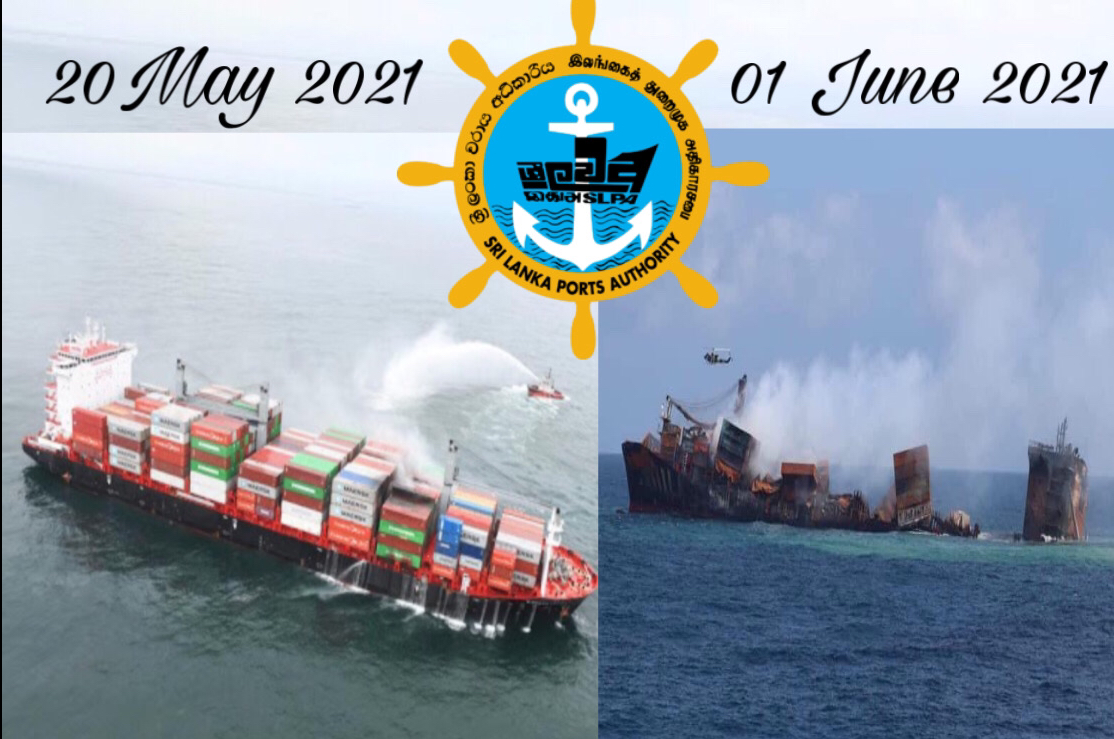The main opposition SJB in a statement on the disaster involving the Mv X-press Pearl condemned the irreversible damage caused to the environment due to negligence by the authorities.
Dr Dan Malika Gunasekera of the SJB Policy group, emphasized the opposition party’sdismay over the unprecedented marine pollution caused to the coastal belt and its waters.
The excerpts of the statement are as follows:
Once again the maritime waters of Sri Lanka suffered unprecedented environmental damage, with MV X-Press Pearl, a vessel carrying 1486 containers including 81 tanks of Dangerous Cargo such as Nitric Acid, Ethanol, Sulfuric Acid and the like going into flames in the early hours of 21st May 2021.
This is less than a year since MT New Diamond caught fire within the exclusive economic zone of Sri Lanka off the Eastern border. That too caused huge environmental damage by crude oil carried on board that vessel. That was to be the second-largest oil spill in the world had it discharged the total quantum of cargo that was on board.
MEAGRE COMPENSATION FOR IRREVERSIBLE DAMAGE
With Sri Lanka recovering only an extremely modest cost for the joint exercise conducted by Sri Lankan and Indian naval authorities, with compensation for the pollution damage amounting to a total sum of Sri Lankan Rupees 442 million, and the fine against the Master of the vessel MT New Diamond accounting for another 12 million Sri Lanka Rupees as the penalty, the episode only ended arousing national attention on how best we could avoid such debacles for the future.
INCIDENT WITHIN JURISDICTIONAL AREA OF PORT OF COLOMBO
This time, the incident came to be reported within the jurisdictional area of the Port of Colombo.
The chemical substances, as well as the dispersants used to douse the fire onboard the MV XPress Pearl, caused enormous environmental damage to the maritime zones of Sri Lanka stretching along the coastal belt from around Payagala in the South, to up to the Negombo beach including the bays and lagoons.
While the total quantum of damage and loss is yet unknown, natural fauna and flora in the maritime waters are said to have faced a severe impact leading to what could be called a ‘dead environment’, with the vessel owners now declaring to their insurers a constructive total loss to the ship.
LACK OF TRANSPARENCY IN COMPENSATION RECEIVED LAST TIME
Amidst the statement made by the Government of Sri Lanka in respect of the compensation received on the earlier occasion, proper utilization of funds so received have not been tabled in Parliament.
This raises doubts as to how they have been used for futuristic measures. Had the Sri Lankan Government utilized those funds to better prepare for a future incident of the present nature with the acquisition of technical capabilities and apparatus needed by maritime authorities, we could have acted effectively to minimize the damages caused by the current debacle.
OUTDATED LEGISLATION WITHOUT LEARNING FROM PAST DEBACLES
The Marine Pollution Prevention Act No 35 of 2008 being the only legal instrument by which liability could be imposed upon the polluter is indeed outdated and does not aptly cover scenarios of this nature.
However, section 23 provides many teeth in requiring every ship that enters the territorial waters of Sri Lanka to be fitted with such equipment for the prevention of the discharge of oil, harmful substances or any other pollutant.
SRI LANKAN STATE FAILS TO BE ACCOUNTABLE TO CITIZENS
Section 24 enables to take such urgent and immediate measures in respect of the ship or its cargo or any oil on board the ship as may be necessary to prevent, mitigate, or eliminate such pollution or the threat of such pollution.
It is in that context many doubts arise as to the failure of port and coastal State controllers of the country in failing to prevent the present maritime disaster, letting a huge catastrophe occur at the expense of the rich marine resources covering the entire country that accounts for trillions of rupees if not US Dollars in a developing economy like Sri Lanka.
The present marine environment damage and expected loss would be so enormous that money cannot substitute for the already destroyed bio-diversity surrounding Sri Lanka, the pearl of the Indian Ocean.
Section 34 of the Marine Pollution Prevention Act does not provide the necessary teeth in imposing civil liability upon the polluter’s vessel. Hence the absence of national legislation to combat marine pollutions of this nature become extreme setbacks not only in the process of obtaining compensation but also in the reinstatement of the devastated bio-diversity of the waters and the nearby environment.
NON-RATIFICATION OF INTERNATIONAL LEGAL INSTRUMENTS
Sri Lanka has neglected the ratification of some important international legal instruments to keep pace with the developments of the shipping industry, and this was highlighted as an audit finding during the last audit conducted by the International Maritime Organization.
While these are grave and unpardonable blunders, the country has not been able to incorporate the International Conventions relating to Hazardous and Noxious Substances of 1996 or its amendment, and the Bunker Oil 2001, into its local legal regime.
The government has also failed to obtain the expertise we already possess in the country. The present administration has failed to proactively take measures in establishing a sound legal domain while calling ourselves the ‘maritime hub’ of the region.





